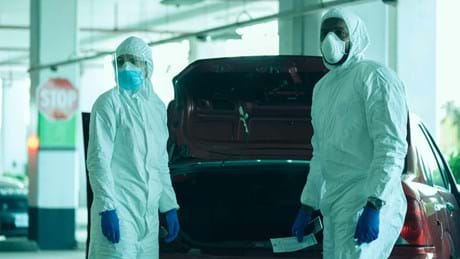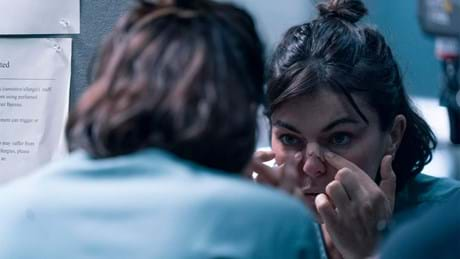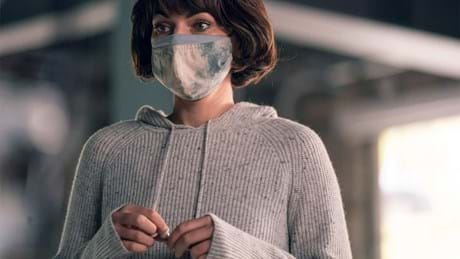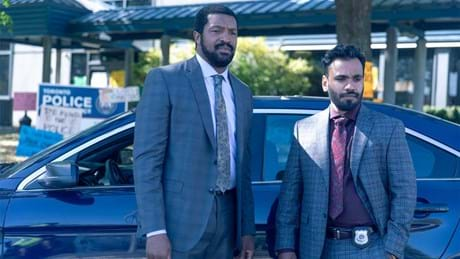The cast and creators of Coroner talk about what to expect in S3
05 March 2021Body farms, Black Lives Matter, witchcraft and COVID-19 all come into play in Coroner S3. But above all, this is a story about people and hope
Body farms, Black Lives Matter, witchcraft and COVID-19 all come into play in Coroner S3. But above all, this is a story about people and hope
The drama series, Coroner, is based on the Jenny Cooper series of novels by M.R. Hall. It centres around Toronto-based coroner Jenny Cooper (Serinda Swan) and returns for a much-anticipated third season on Universal TV (DStv channel 117) this March.
As the season begins, Jenny is single again after breaking up with her S2 boyfriend, Liam (Eric Bruneau), but that’s honestly the least of her concerns. With the season opening in the midst of the COVID-19 pandemic, everyone in Jenny’s office is run off their feet dealing with the dead and the early uncertainties about the virus’s transmission.
“Jenny's job, in particular, is the baseline of the pandemic. Every single body that comes in because of the virus or because of anything else that's going on in the world, goes through her office,” Serinda points out. “At the beginning of the season, you see this overwhelming her, and you see this despair and exhaustion. Jenny is trying to keep it together and understand that she is collecting these bodies.”
As the story continues, Jenny will have time to breathe again and to tackle new ways of processing not just the trauma of that onslaught, but of her troubled past stemming from her involvement in her sister’s death when she was a child. This is along with her father, Gordon’s (Nicholas Campbell), slow, continued descent into dementia as he starts hallucinating about his past, and raising her teenage son, Ross (Ehren Kassam), who’s growing up fast. And there’s a new love on the horizon too.
One of Jenny’s closest allies, veteran detective Donovan “Mac” McAvoy (Roger Cross), will be facing his own unsettling health crisis – which has his cop partner, Malik Abed (Andy McQueen), deeply concerned and mother-henning him a bit. And Mac and Malik will also be reckoning with Canada’s own police brutality issues and protests.
We spoke to Coroner’s executive producers, Morwyn Brebner and Adrianne Mitchell, as well as Serinda, Roger and Andy, about what we can expect…
“The pandemic is in the show,” says Morwyn. “When the lockdown started here, I had started writing the premiere already [around April 2020], and we completely changed it. Our show deals with death and across the whole world, people have been dealing with this awful situation. It felt like we had to put it in the show.
"The whole season is not about the coronavirus, but it shows up in little places. There are points in the show where, well, the first episode really is about it… but it shows up in the series. People wear masks because this is the reality that we are living all across the world. We're dealing with the pandemic and the sadness that people have in the world right now. In a way, the show has freed up the characters to be more themselves, so there is really a lot of humour in the season too. We're all changing the ways we live.”
Adrienne adds, “It's been strange because we're working with storylines that deal with how society is dealing with the pandemic, and we're also as a crew experiencing the pandemic and having to work in a different way. Life is imitating work, and work is imitating life. We feel connected to how we tell stories now in a way that is different. Things have changed.”
Serinda jokes that it’s unfortunate timing for Jenny to have masks become such a big thing just as she was starting to want a little glamour back in her life. “There is an episode where finally, I was so excited, they wrote red lipstick in for Jenny's character. And then 90% of the episode I'm wearing a mask! I was like, ‘Darn it, I don’t get to show my lipstick!’” Serinda fakes a whine, then laughs. “And then when I did get to, [she mimes removing her mask], it would just be on [all over] my face. I was like, ‘This is the worst time ever for Jenny to be glammed up.’"
A touch of strangeness
The weird, almost hallucinogenic atmosphere that’s arisen during the global pandemic inspired the series’ writing team to experiment with reality a little this season. Adrienne reveals, “There's a way of being in the world right now because of the pandemic, where your life has changed, the way you are with people is different, your sense of time is different, your imagination is different. You may spend more time alone. There's an element in the series where we are moving into worlds of imagination in a way that we haven't before. We go into the world of witchcraft and teenage witchcraft, and our main characters remember their own pasts and how they used to escape from reality. There's a lot of interesting moments visually, where we feel like we're in a different time realm. We're shooting things visually in a way that got a kind of strange magic.
“We're all living in this strange, altered state where our perceptions are different. We have moments of the characters accidentally getting high on marijuana. I've been enjoying working with these elements visually. It's a beautiful escape from the harsh realities. It's also a journey into one's imagination to connect with something that is a life force beyond the harsh realities we're all facing in the pandemic. There's that spirit in the season, magic and spirituality and fun and unexpected surprises. All of that,” says Adrienne.
Morwyn agrees. “We were really trying to show the idea that life can surprise you. People can change their ways of being. Jenny can encounter things that surprise her and change her in new and profound ways. That really came from the way we are living now.”
“You always start the season thinking what is new,” says Morwyn. “We go back often to Jenny's original trauma where she pushed her sister down the stairs as a child. And what the long fallout has been in terms of her trauma, in terms of her life, in terms of her relationship with death, in terms of her job. We go back to that and ask what that unlocks in her that feels new, that she can work through, that she can resolve that can bring her out into the wider world.
“Last season was drilling deep down with her. This season we were asking okay, we drilled down, what will happen if we open up? So Jenny opens up to the world and tries to confront the world in a way that instead of being down and inward, takes her out and forward. We're trying to have her out in the world being open to things, confronting new things, confronting new people, and seeing what that does to this amazing character,” says Morwyn.
“When we see Jenny in S3, she is dealing with things with a new spirit of ‘I'm going to do this’,” Morwyn adds. “She's doing a new therapy [for her severe anxiety disorder] with Dr Sharma (Saad Siddiqui) that is really interesting, and she's attacking things with a can-do, feisty spirit. She has moments of grace and moments when things are hard, but she continues to struggle to find the happiness that she really does deserve.”
Serinda says, “In S1, she was going through the trauma of realising that it was she who was responsible for her sister's death. Moving through the seasons, she’s been able to deal with that trauma and internalise and understand, but also really suppress. So it's an amazing opportunity for me to be able to see the healing process, not to just be healed. Sometimes you have a realisation, or you are working with a therapist and find out that there is something that is [coming from] abandonment issues or whatever it might be, and then once you figure it out, you're not like, ‘Aha! I’m healed! Fabulous’. Then it's the process of, well, what does that mean and how does that integrate into my life, and how does this still show up?”
All those concerns are pushed aside at the start of the season, which is 100% focused on work. But pretty soon they’ll be bleeding through again. “Because she’s dealing with the pandemic right off the top, everything is on hold,” says Serinda. “And coming out of S2, working a lot with her father, her relationship on that side is going well, but it's difficult for her to be watching him deteriorate with his Lewy body dementia, and she’s also worrying about her father because he's a senior with COVID-19 being around. Each relationship develops a little more slowly because of COVID-19. But there's also a really beautiful storyline this year between Donovan [Mac] and Jenny. We've seen so many shows where you've got the two main characters who are always around and eventually they become an item, and that's not what we are doing in this show. We are showing amazing camaraderie between them. It's really lovely.”
You couldn’t have a series set in 2020/2021 without addressing the Black Lives Matter movement and the global concern about racially motivated police brutality. For the Coroner team, that meant paying closer attention to how their good-guy cops, Mac and Malik, behave. “It has made us think a lot. This season, we do represent the police killings. We do talk about the [Black Lives Matter] protests because it's such a present fact of life in Canada as well,” says Morwyn.
“It made us think about the way our police acted with suspects. In police shows, you're always [asking] what's exciting, right? What's exciting is you run after someone and you tackle them and throw them to the ground. That's exciting,” says Morwyn. “But it's also a way in which people, especially racialised people, are killed and brutalised.
"So we ended up talking to our police consultants and asking about other ways that police can act so that we're not reinforcing this Bad Boys stereotype that's not okay. It’s not okay [to think that] because our police are good, they can do these things. We talked a lot about responsibly responding to the moment. We have an episode that jumps off that moment. We've had episodes about police injustice towards people of colour in the show before, but we hope it's a sea change in the way that policing is done and the way people are treated. We have tried to reflect it in the show.”
Adrienne adds, “There are a lot of moments of people protesting outside police stations. We've had a story running through the series that is a small lie that has a significance at the end. It's been an interesting discussion. There are other ways to apprehend people, there are other ways to defuse a volatile situation in a way that doesn’t end up in brutal and unjust violence.”
Mac and Malik aren’t just a symbol of policing in the series. They’re real characters with their own struggles too. And for a self-sufficient character like Mac, it’s going to be a challenge to accept his own vulnerability in the face of health issues.
“McAvoy is a strong guy, so he doesn't want to rely on anyone so much. He's still trying to act like, ‘Oh, everything's fine,” and you know, he's trying to take care of things on his own,” says Roger.
“But he will need people down the road. As a strong man and the guy in charge and all that, sometimes it's hard to be vulnerable and allow people in to help you when you need them. That'll be part of his journey. We do need others and however strong you are, whether it be physically, emotionally or mentally, you will need to learn to rely on others when you need them because that's also a sign of strength. Being able to say, ‘Listen, I can't do this by myself, I need others' I think that's the biggest growth for McAvoy to see.”
Andy adds, “Because of what Mac is going through, it also leads to Malik having to step up in a way that he's never had to before and sort of take the reins at times. It will be interesting to see how he deals with that or how he fumbles with that. For Malik, S3 is him stepping up and having to take some leadership, which I don't think he's had in seasons before. We've seen him be the joker or whatever it may be, but this season we're going to see him step more into his role as a detective and take it more seriously. Because of his admiration for McAvoy, he's becoming a better detective. But he's still very funny and you gotta enjoy it. He's always trying to figure out when to crack a joke or when to take it seriously, and I think he learns more about that in this season than before.”
As officers of colour, Mac and Malik offer an intriguing point of view on the Black Lives Matter protests. “We have a case that will be brought to light with regard to that and I don't wanna get into too much detail, but the writers incorporate the coronavirus and Black Lives Matter – and in Canada, more so the Indigenous Lives Matter – segment of things. I think we've done a great job of dealing with it without hammering it,” says Roger. “It's beautiful and well handled. They're so respectful and it's great to have a team like that to work with, in our writers.”
Roger adds, “We have to toe that line between being ethnic and also being police officers. This is tough in the balance because there are certain people in your own community who will say that they don't like the police, that they don't trust them for several reasons. You are everything that they hate, but also everything that they love because you're on their side. But some don't see it that way. You have enemies on both sides of the thing that love you and hate you for various reasons. It's their burden to bear but they've chosen to do this and they do it with dignity.”
Andy insists that in terms of this issue, Mac and Malik are on the same page. “Both are coming from the same place with regard to the movement itself and with regard to Indigenous Lives Matter.”
Mac also has Jenny in his corner. “We have some amazing moments together in S3,” says Roger. “Right from the get-go, in episode 1, we have a scene where they are out together and they learn to come to rely on each other quite a bit. They laugh together and cry together and all of it. We have a couple of pretty special scenes in episode 1, and then you just carry on through the rest of the season. They’ve developed a great friendship with great trust in each other and it continues to evolve.”
As for Mac’s love life after he got his heart crushed in S2, Roger says, “So do you get back up on that horse and ride, or do you go back within yourself when you're burnt, do you go a bit back in a shell? What was great about S2 was you saw who he was in love with, he seemed to open up a little bit. He got set back there a little, and so he starts the season in that place, but he’s not a shy guy and he's not gonna just shut himself off and so yes, he will give it a go again, and he will try to find love. Life is short and he, and especially as police officers, know that at any time things could go south and so they have to embrace life and embrace things, which is what I think he starts doing more of this season.”
Along with Jenny, Mac and Malik’s stories, the Coroner team brings another new element into the series this season. In S3, we’ll be paying a visit to the body farm. True crime and forensics fans are in for a treat. “One of the things that got us the most interested this season was the idea of a body farm, which is a place where pathologists and researchers study the decomposition of bodies. This is something that shows up at some point in the show. We were so interested in this because there is one here in Ontario in the province where we are, and people became fascinated by the body farm and how you watch bodies decompose. That was 100% an interesting thing that's new to the show,” says Morwyn.
Watch Coroner S3 from Monday, 8 March, on Universal TV (DStv channel 117) at 20:00
Universal TV is available on DStv’s Premium, Compact Plus, Compact and Family packages. To upgrade your package or to get DStv, click here.




